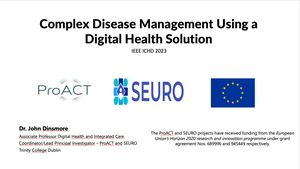John Dinsmore spoke at the IEEE International Conference on Digital Health
Sat Nov 04 2023
SEURO coordinator Dr. John Dinsmore spoke at the IEEE ICDH held in Chicago on the 5th of July 2023. The focus of the talk was on how the adoption of digital health solutions could help complement the single disease framework of care which forms the basis of EU and US healthcare systems and in doing so potentially off-set the inequities in care experienced by those managing multiple health conditions, which has been shown to be largely inefficient, inconvenient and burdensome for patients1,2.
In the talk Dr. Dinsmore highlighted that understanding multimorbid patient engagement with digital health solutions is key to their future adoption and presented findings on the participant engagement with the ProACT platform from the initial ProACT H2020 proof of concept trials (www.proact2020.eu)3. Outcomes showed positive results, with 77.5% of participants (n=93) engaging with the platform consistently over the 12-month trial4. More than 80% of participants used the ProACT devices for over 200 days submitting symptom parameters 3-4 times a week, self-report health data 2 times a week and exercise and sleep 6 days per week. The majority of the interactions were in the morning and the most common time for symptom parameters was 10 am and for weight measurements 8am5. These findings as well as others from the trial have helped inform and optimise the context for delivery of the platform in the SEURO trial currently underway across Ireland, Belgium and Sweden.
The talk concluded with a reflection on the future of digital health in the EU and the need to be cognisant of the increasing number of regulations that will govern the digital health space (e.g. General Data Protection Regulation (GDPR), Medical Device Regulation (MDR), Health Technology Assessment (HTA) Regulation, European Data Governance ACT, EU Artificial Intelligence Act and European Health Data Space). Dr. Dinsmore stressed that clarity for digital health research projects on the application of new or modified regulations was important to ensure citizens are protected, the speed of innovation is not stifled, and research is future proofed for translation to societal use.

Refs:
-
Barnett, K., Mercer, S. W., Norbury, M., Watt, G., Wyke, S., & Guthrie, B. (2012). Epidemiology of multimorbidity and implications for health care, research and medical education: A cross-sectional study. The Lancet, 380(9836), 37-43. https://doi.org/10.1016/S0140-6736(12)60240-2
-
Skou, S. T., Mair, F. S., Fortin, M., Guthrie, B., Nunes, B. P., Miranda, J. J., ... & Smith, S. M. (2022). Multimorbidity. Nature Reviews. Disease Primers, 8(1), 48. https://doi.org/10.1038/s41572-022-00376-4
-
Dinsmore, J., Hannigan, C., Smith, S., Murphy, E., Kuiper, J. M. L., O'Byrne, E., ... & Doyle, J. (2021). A digital health platform for integrated and proactive patient-centered multimorbidity self-management and care (ProACT): Protocol for an action research proof-of-concept trial. JMIR Research Protocols, 10(12), e22125. https://doi.org/10.2196/22125
-
Doyle, J., Murphy, E., Gavin, S., Pascale, A., Deparis, S., Tommasi, P., ... & Dinsmore, J. (2021). A digital platform to support self-management of multiple chronic conditions (ProACT): Findings in relation to engagement during a one-year proof-of-concept trial. Journal of Medical Internet Research, 23(12), e22672. https://doi.org/10.2196/22672
-
Sheng, Y., Doyle, J., Bond, R., Jaiswal, R., Gavin, S., & Dinsmore, J. (2022). Home-based digital health technologies for older adults to self-manage multiple chronic conditions: A data-informed analysis of user engagement from a longitudinal trial. Digital Health, 8, 20552076221125957. https://doi.org/10.1177/20552076221125957
